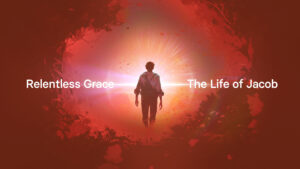The Hunger Games – Genesis 25:19–34: Reflection Guide

Reflection Guide
Key Terms
Abraham – Abraham was called by God to become the father of God’s people—Israel, and to ultimately be a source of blessing for all nations (Gen 12:1-3; Abraham’s story can be found in Gen 11:26-25:8).
Isaac & Rebekah – Isaac was Abraham’s son. He was promised to Abraham and Sarah by God even though they were close to 100 years old and never able to have children together (Gen 17:15-27 & 21:1-7). Before his death, Abraham—who was living in Canaan—sent one of his servants to find Isaac a wife from among his own people (Gen 24). Isaac’s wife was Rebekah.
Background
The life of Jacob begins in Genesis 25 with the birth of he and his brother, Esau. The writer sets the scene with a genealogy back to Abraham, who—with Sarah—fathered Isaac, who—with Rebekah—fathered Esau and Jacob (vv.19-20). We also learn that Isaac and Rebekah struggled to have children similarly to Isaac’s parents. However, Isaac prays and the Lord grant(s) his prayer and Isaac and Rebekah conceive twins (v. 21). We are then told that Rebekah seeks the Lord because she is wondering at the struggle in her womb (v. 22). Both twins and unexpected pregnancy symptoms were considered omens in the Ancient Near East and so Rebekah’s concern was not unusual. In response to her questions, God tells Rebekah, Two nations are in your womb, and two peoples from within you shall be divided; the one shall be stronger than the other, the older shall serve the younger (v. 23). Through this message, Rebekah and Isaac learn that they are having twins who will grow into two nations where Jacob will have authority over his brother Esau. Though it was not customary for older siblings to submit to younger siblings, this pattern repeats itself later in Genesis (see Gen 38:27-30, 48:14-20, 49:8). Once born, the twins’ differences are quickly apparent. Esau comes out with a striking red and hairy appearance and becomes a skillful hunter and man of the field, while Jacob comes out holding Isaac’s heel and becomes a quiet man (vv. 24-27). We learn that Isaac loved Esau but Rebekah loved Jacob, and while this word loved doesn’t mean that Isaac and Rebekah felt animosity towards the other child, it does indicate a strong preference for one over the other. Chapter 25 then closes with a story of the twins. One day while Jacob was cooking, Esau came in from the field tired and famished and Jacob convinces Esau to trade his birthright—as the eldest son—for some of Jacob’s stew (vv. 29-34). Scholars don’t know what exactly this birthright would have entailed but it likely included significantly more financial resources and property than younger children would have received.
Did You Know?
The people that would come from Esau were the Edomites (see Gen 36). The Edomites and Israel would have frequent conflicts, including during the reign of Saul and David and during the period between the OT and NT. Interestingly, Herod the Great—who ruled Israel when Jesus was born—was an Edomite.
Going Deeper
Read 1 Samuel 16:6-13 and Luke 22:24-27. Reflecting on these verses and the birth of Esau and Jacob, how are God’s ways often different than what’s expected? How does that encourage you? How does it challenge you?
Reflection Questions
Learning the Word
1. Read Genesis 25:19-34. Make 5-7 quick observations comparing and contrasting Jacob and Esau.
2. What is Jacob’s family heritage? Who were his parents and grandparents? How can our heritage influence who we are, both positively and negatively?
3. In verses 21-28, how does the birth of Jacob and Esau depict their future relationship? What is prophesied about each of them in verse 23?
4. Read verses 27-34. In what ways are Jacob and Esau each wrong in the incident surrounding the bowl of stew? Who is the good guy in the story?
Living the Word
5. Why is it so hard to wait on God’s fulfillment of his promises and so easy to seek the blessing or life we want through a shortcut?
6. How does this episode in the lives of Jacob and Esau remind us of our own need of a Savior and the grace of God?
7. Discuss the following statement: “Most of us believe in God’s grace—at least in theory, but we often struggle to trust it in our everyday lives, so we live by an internal scoreboard of our successes and failures.” Do you agree? Why or why not?
8. What are you looking forward to in this series on Jacob’s life? Where do you need God to work in your life through this study of his Word?
